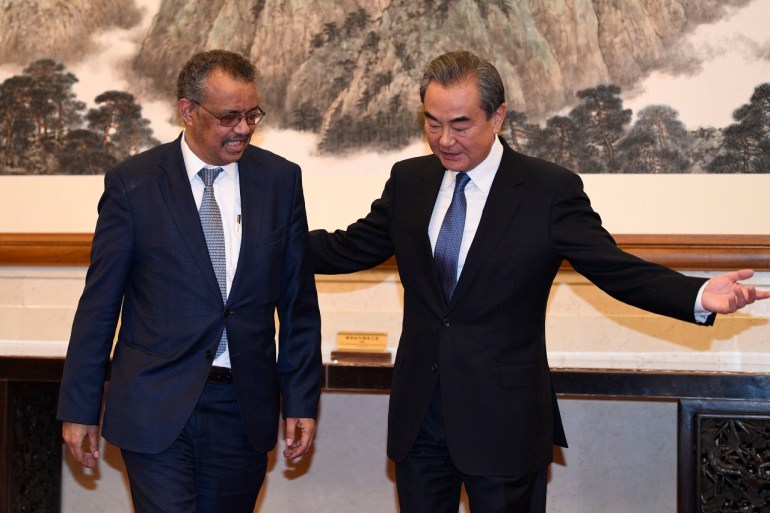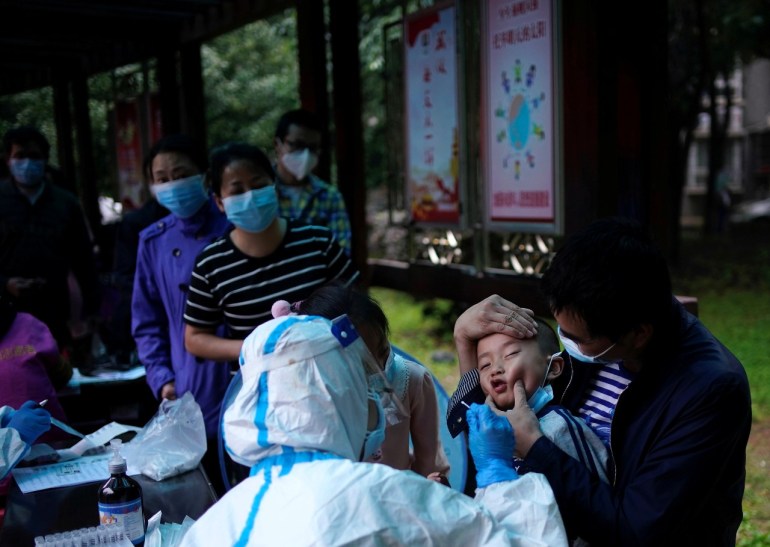‘Very disappointed’: WHO’s COVID experts blocked from China
International team is supposed to travel to Wuhan to investigate origins of the virus that swept the globe in 2020.

The head of the World Health Organization (WHO) says he is “very disappointed” that China has still not approved the entry of a team of international experts tasked with investigating the origins of the coronavirus, as some countries grapple with the increasing burden of the pandemic.
Two members of the 10-strong international team had already begun their journey to China, when it emerged that they had still not been granted entry, WHO Director-General Tedros Adhanom Ghebreyesus told an online news conference in Geneva on Tuesday afternoon.
Keep reading
list of 4 itemsBoris Johnson orders new England COVID lockdown
Vaccine hesitancy rises in Indonesia amid COVID-19 pandemic
How did the pandemic begin? WHO team to seek answers in China
“Today we learned that Chinese officials have not yet finalised the necessary permissions for the team’s arrival in China,” he said, noting that the WHO, China and transit countries had worked together on the arrangements.
“I have been in contact with senior Chinese officials and I have once again made clear that the mission is a priority for WHO and the international team. I have been assured that China is speeding up the internal procedure for the earliest possible deployment.”
The WHO expert team – led by Peter Ben Embarek, the WHO’s leading expert on animal diseases that cross the species barrier – is supposed to travel to Wuhan where the first cases of the coronavirus were reported at the end of 2019 to make in-depth “epidemiologic, virologic, serologic assessments” of people and animals in an attempt to find out where the virus might have come from.

Some 86.2 million people around the world have now been diagnosed with COVID-19 and 1,895,267 have died, although vaccine approvals have raised hopes that the pandemic might be brought under control.
Of the two team members who had already begun to travel one had now turned back and the other is in a third country, emergencies chief Mike Ryan said.
“We trust and hope that is just a logistic and bureaucratic issue that can be resolved very quickly,” he said.
China said on Wednesday it was still negotiating with the World Health Organization the dates and itinerary for a visit by international experts.
China’s position on the hunt for the origins of the pandemic “has always been open and responsible,” said Foreign Ministry spokesperson Hua Chunying.
She said that China has a close cooperation with WHO.
“The origins problem is very complex. To ensure that the work of the global experts group in China is successful and to carry out the necessary procedures and relevant concrete plans, currently both sides are still in negotiations on this,” Hua told a regular press briefing. “I understand that it’s not just a visa problem and the actual date and itinerary. Both sides are still in close communication.”
China’s disease experts are currently busy with multiple small-scale clusters and outbreaks reported in the past couple of weeks, she added.
“Our experts are wholeheartedly in the stressful battle to control the epidemic,” she said.
New narrative
China has dismissed criticism of its handling of the early weeks of the outbreak whether from governments overseas or from its own citizens.
It has also sought to reframe the debate about where the pandemic began, with senior diplomat Wang Yi saying “more and more studies” showed that it emerged in multiple regions. Ryan has previously called such claims “highly speculative”.

The WHO has said that despite ongoing research “very little is currently known about how, where and when the virus started circulation in Wuhan” with the first cases linked to the now-closed Huanan Seafood Market. The central Chinese city reported its first death from the illness on January 11 last year – a 61-year-old man who was a regular shopper at the market.
The experts are expected to visit the site although much of the evidence was probably lost when health authorities sealed off the market and disposed of what was there. It is still unclear if the market was a “contamination source, acted as an amplifier for human-to-human transmission, or a combination of those factors,” the panel’s terms of reference noted.
After months of negotiations the WHO says China has not authorised the entry of its team of #coronavirus experts to study the origins of the outbreak. Wuhan’s Huanan market, where we filmed last week, was one of the locations they were planning to study. #China #COVID19 pic.twitter.com/y35rcNueG2
— Katrina Yu (@Katmyu) January 6, 2021
The United States has called for a “transparent” investigation into the virus’ origins. Australia has also called for an independent inquiry into how the virus emerged, which has added to tensions between the two countries.
China has largely recovered from the pandemic but continues to take tough measures to stamp out any emergence of the virus.
On Wednesday, authorities closed sections of highways running through Hebei province that surrounds Beijing and shut a key long distance bus terminal in the provincial capital Shijiazhuang.
Hebei accounted for 20 of the 23 new locally transmitted COVID-19 cases reported in mainland China on January 5, more than the total of 19 cases in the province in the previous three days.
The province also accounted for 43 of the 64 new asymptomatic cases – patients who have been infected with the SARS-CoV-2 virus but who are not showing any symptoms.